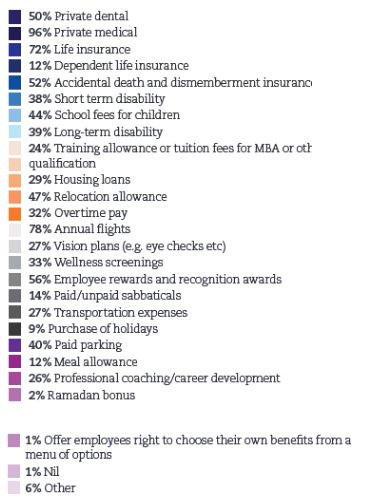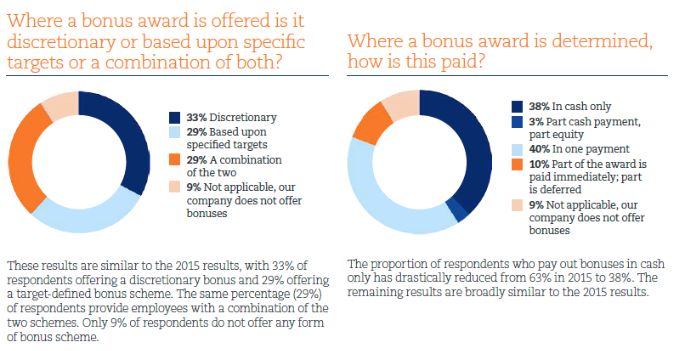Compensation and Benefits is often at the centre of key debates on the workforce in any business; issues of how to attract talent and how to retain it will often come back to a discussion of whether an employer is paying enough in salaries or offering the right set of benefits or bonus and commission structure. However, as we move into a dynamic in which we have multiple generations in the workforce (Generation X, Y and Z) and an economy shaped by technological innovation, it may well be that the key attractions for attracting and retaining talent will actually be policies which cost very little to the business.
What are Employers Currently Offering?
Our UAE 2016 Workplace Study found that 43% of respondents offered benefits in order to retain staff; with only 11% stating that the focus of benefits was to attract new staff. This perspective demonstrates an interesting shift in focus in a maturing economy and one which it is fair to say has been affected by the oil slump. Interestingly 18% of respondents also stated that they offered benefits in order to keep up with market trends. In terms of the range of benefits offered, the following chart shows the variety of benefits on offer:

Incentives: Commission or Bonus
Much has been made of commission and bonus schemes being a method for aligning individual goals with business ones and, the importance of such schemes encouraging long term growth rather than short term risk taking especially within financial services. Our UAE 2016 Workplace Study found that employers continue to operate bonus schemes based largely on a mixture of soft and hard targets, involving personal goals, team targets and overall company performance.



In terms of retention, most commission and bonus schemes encourage retention through claw back provisions or vesting over a period of time, in addition to scheme rules disqualifying employees if they are under notice or not in employment on the date payment is made.
Employee ownership: John Lewis Model
Another model for obtaining employee buy in is through employee ownership schemes, or employee share schemes. John Lewis Department Store in the UK is famously an organisation entirely owned by its staff; with profits flowing to staff and not shareholders. The company has a constitution whose aim is to maximise staff happiness and the staff council is a mechanism for drawing in staff views and feeding them through the organisation's management. This model whilst unique does offer an example of how employees can be invested in the long term future of their employer.
A more common model for promoting at least partial employee ownership is the operation of employee share schemes or long term incentive schemes, whereby employees are offered shares in the company over a period of time, or options to purchase shares. Such schemes typically involve eligible employees being granted shares which vest over a three year period or following which the employee can operate the option to purchase the share at the original price at the time of the grant (the benefit is then the assumed gain in share price over the three years).
It can be difficult to offer employee share schemes in the UAE due to pre-emption rights for existing shareholders under the UAE Companies Law. These rules were recently relaxed for publicly listed companies. Listed companies are now able through a special resolution passed at a General Assembly meeting to increase share capital and issue an employee share option scheme (which cannot cover directors).
Basket of Benefits
Another option for employers is to offer employees a basket of benefits from which they can choose a variety of benefits up to a certain value; for example they could be offered benefits up to the value of AED 30,000 a year and choose a combination of benefits which most suit their needs during that year; for example purchasing additional holiday, gaining assistance with school fees, metro costs and so on.
Holidays and Flexible working – the low cost incentive
In September 2014, Virgin announced that it would offer its staff unlimited holiday and not track their taking of leave. Whilst for many such a move appears chaotic, some research indicates that the policy doesn't in fact result in staff taking more leave and actually increases productivity. A similar measure would be operating agile or flexible working whereby employees are free to determine the start and end times to their working day, whether they work at home/remotely or at the office, and even their working days. The importance of flexibility and personal empowerment for employees will only increase as employees balance work with commitments such as childcare, care for elderly parents and personal commitments. For a younger generation, pursuing a career may have parity with what for past generations might have been regarded as a hobby meaning that work and life balance now means being able to intersperse periods of work with potentially periods of travel or time out doing other things.
Employees often respond well to being given the right (not option to apply for or ask for) to flexible working as it enhances their own responsibility to deliver and take control of their working lives, whilst also for many taking the stress out of their working day; being able to do the school pick up, attend the school concert or on a personal level make it to the gym without worrying about being perceived as workshy or lacking career focus. On 10 March 2017, Robert E Kelly's BBC skype interview was interrupted by his children to the delight of most onlookers and this was an amusing example of when work and personal life merge!
The content of this article is intended to provide a general guide to the subject matter. Specialist advice should be sought about your specific circumstances.
